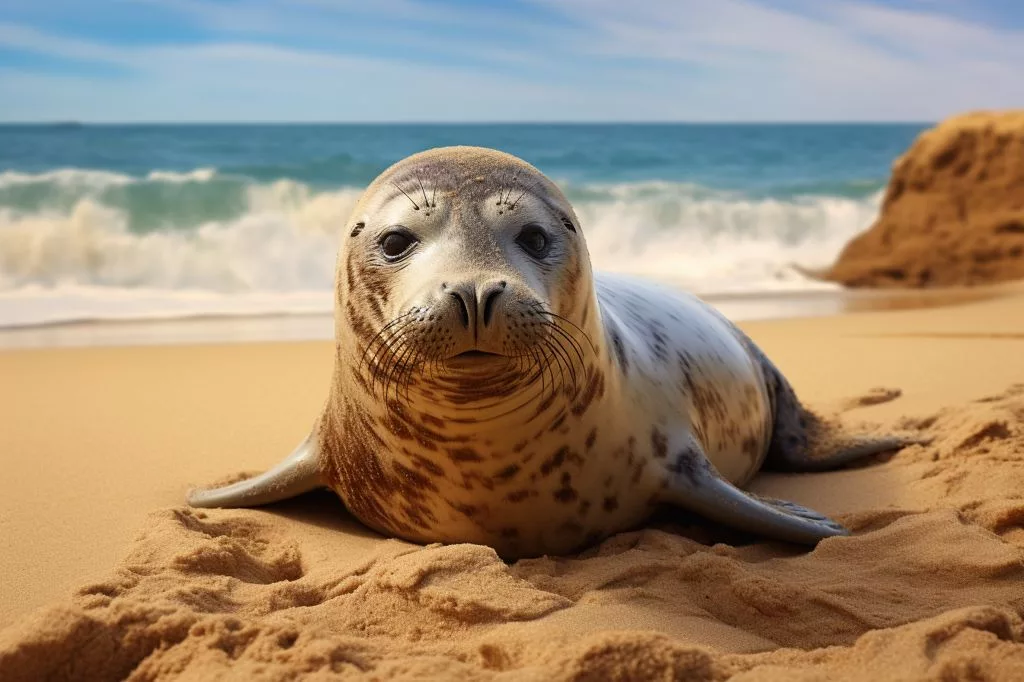The relentless harassment of a seal by beachgoers at Strand Beach in Cape Town led to the tragic death of the animal and an assault on a woman. The City of Cape Town and the Society for the Prevention of Cruelty to Animals (SPCA) warned about the serious consequences of disturbing coastal wildlife and emphasized the importance of coexisting and respecting the natural habitats of animals. The incident serves as a clear reminder of the fragility of the balance between humans and nature and the significant impact of our actions on the ecosystem.
What happened to the seal at Strand Beach in Cape Town?
Persistent harassment of an adult seal by beachgoers at Strand Beach led to the tragic death of the animal and an assault on a woman who stumbled upon it. The City of Cape Town and the Society for the Prevention of Cruelty to Animals (SPCA) condemned the incident and warned about the serious consequences of disturbing coastal wildlife. The seal died from excessive stress after being captured and transported to the Two Oceans Aquarium.
A Disturbing Incident at Strand Beach
A shocking event recently took place on Strand Beach, Cape Town, where the persistent harassment of a seal led to an assault on a beachgoer and the tragic death of the animal. The City of Cape Town and the Society for the Prevention of Cruelty to Animals (SPCA) have denounced the incident, highlighting the serious consequences of such actions.
The regrettable episode transpired over several days, with beach visitors continuously tormenting the adult seal at Strand Beach. The seal, trying to rest on the shore—a common behavior for its species—suffered from a barrage of rocks, jabbing sticks, dog assaults, and nonstop provocation. On the night of October 18, 2023, the animal finally struck back, biting a woman who accidentally stumbled upon it on the beach. She was immediately taken to the hospital and treated for the bite wound.
Alderman Eddie Andrews, the deputy mayor of Cape Town and mayoral committee member for spatial planning and environment, warned the public about the ramifications of disturbing coastal wildlife. “I would like to inform all beach visitors that it is unlawful to harass any coastal wildlife, and the responsibility lies with the public to maintain a safe distance,” he declared.
The Aftermath and Wildlife Protection Efforts
In response to the incident, the City’s Coastal Management and Law Enforcement teams cordoned off a section of the beach to enable the safe capture and removal of the seal. The SPCA Wildlife Unit, in collaboration with Coastal Management and with authorization from the Department of Forestry, Fisheries, and the Environment (DFFE), transported the seal to the Two Oceans Aquarium. Sadly, the seal died from excessive stress before a wildlife veterinarian could evaluate it and release it at a secure location away from human disturbance.
This saddening event serves as a clear warning to Cape Town residents and beachgoers to respect the natural habitats of coastal animals. Reports of seal sightings have risen recently, with similar incidents occurring at Melkbosstrand, Sunset Beach, and Milnerton Beach. The stress induced by harassment or capture frequently results in the tragic outcomes seen in these cases.
Considering this, the DFFE, the City, and the SPCA generally avoid capturing and relocating seals. The stress involved in the process significantly heightens the animals’ risk of death. As a result, it is crucial for beach visitors to exercise caution and demonstrate compassion towards these creatures.
The Importance of Coexistence and Respect
Throughout history, human-animal interactions have exposed the fragile balance between nature and society. The story of this unfortunate seal encounter reminds us of the famous quote by renowned poet and naturalist Henry David Thoreau: “In wildness is the preservation of the world.” To achieve harmony between humans and wildlife, we must learn to respect and appreciate the inherent value of every living being.
As we reflect on the Strand Beach incident, let us recognize that the responsibility of protecting natural habitats and ensuring the welfare of wildlife rests with each of us. It is our obligation to educate ourselves and others about the significance of empathy, respect, and coexistence with the creatures that inhabit our surroundings. By doing so, we will not only enrich our own lives but also protect the ecosystem that supports us all.
So, the next time you meander along the stunning shores of Cape Town, be both aware and grateful for the natural wonders that envelop you. Exercise caution and respect towards the coastal wildlife, and remember that your actions can have far-reaching effects. By nurturing a sense of understanding and accountability, we can ensure a harmonious relationship with nature and a bright future for the generations to follow.
1. What led to the tragic death of the seal at Strand Beach in Cape Town?
The relentless harassment of an adult seal by beachgoers at Strand Beach in Cape Town led to the tragic death of the animal and an assault on a woman who stumbled upon it. The seal died from excessive stress after being captured and transported to the Two Oceans Aquarium.
2. Who has condemned the incident at Strand Beach?
The City of Cape Town and the Society for the Prevention of Cruelty to Animals (SPCA) have condemned the incident at Strand Beach, emphasizing the serious consequences of disturbing coastal wildlife and the importance of coexisting with and respecting the natural habitats of animals.
3. What actions did the City of Cape Town take in response to the incident?
In response to the incident, the City’s Coastal Management and Law Enforcement teams cordoned off a section of the beach to enable the safe capture and removal of the seal.
4. What was the role of the SPCA Wildlife Unit in this incident?
The SPCA Wildlife Unit, in collaboration with Coastal Management and with authorization from the Department of Forestry, Fisheries, and the Environment (DFFE), transported the seal to the Two Oceans Aquarium.
5. What is the significance of empathy, respect, and coexistence in human-wildlife interactions?
The story of the unfortunate seal encounter at Strand Beach in Cape Town reminds us of the significance of empathy, respect, and coexistence in human-wildlife interactions. To achieve harmony between humans and wildlife, we must learn to respect and appreciate the inherent value of every living being.
6. What are some other beaches in Cape Town where similar incidents have occurred?
Reports of seal sightings have risen recently, with similar incidents occurring at Melkbosstrand, Sunset Beach, and Milnerton Beach.
7. Why is it crucial for beach visitors to exercise caution and demonstrate compassion towards coastal animals?
Capturing and relocating seals can significantly heighten the animals’ risk of death due to stress. Therefore, it is crucial for beach visitors to exercise caution and demonstrate compassion towards coastal animals.
8. What is the responsibility of individuals in protecting natural habitats and ensuring the welfare of wildlife?
The responsibility of protecting natural habitats and ensuring the welfare of wildlife rests with each of us. It is our obligation to educate ourselves and others about the significance of empathy, respect, and coexistence with the creatures that inhabit our surroundings.












